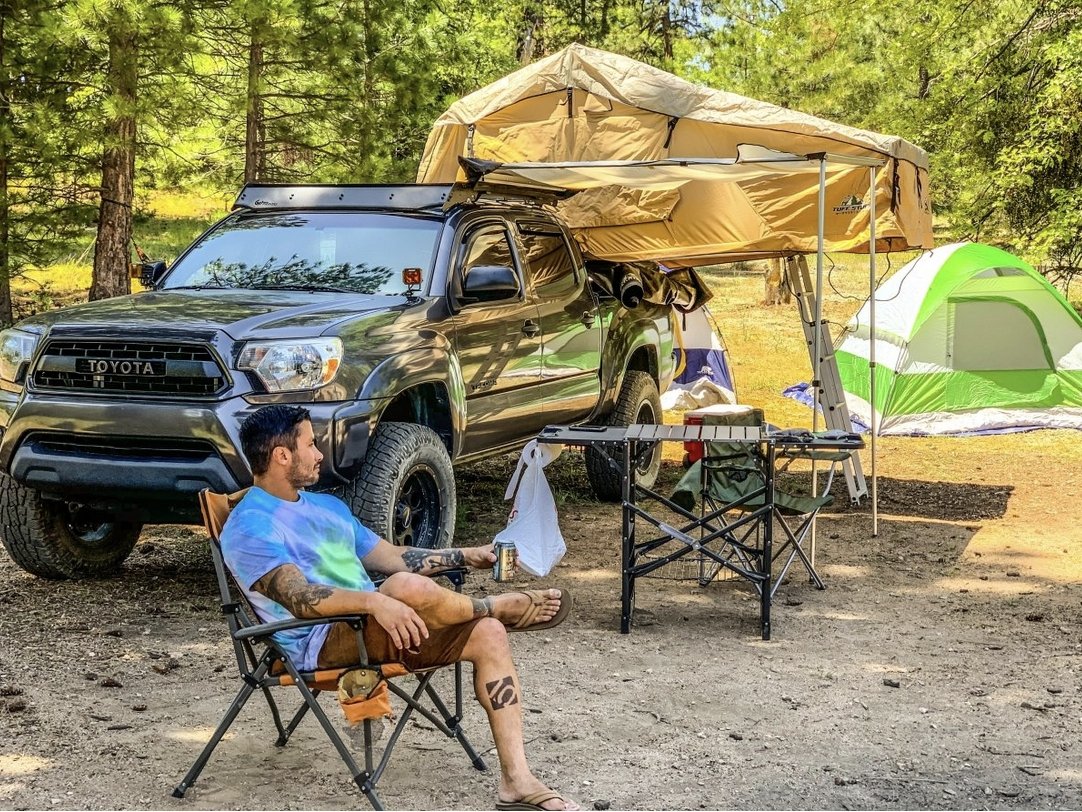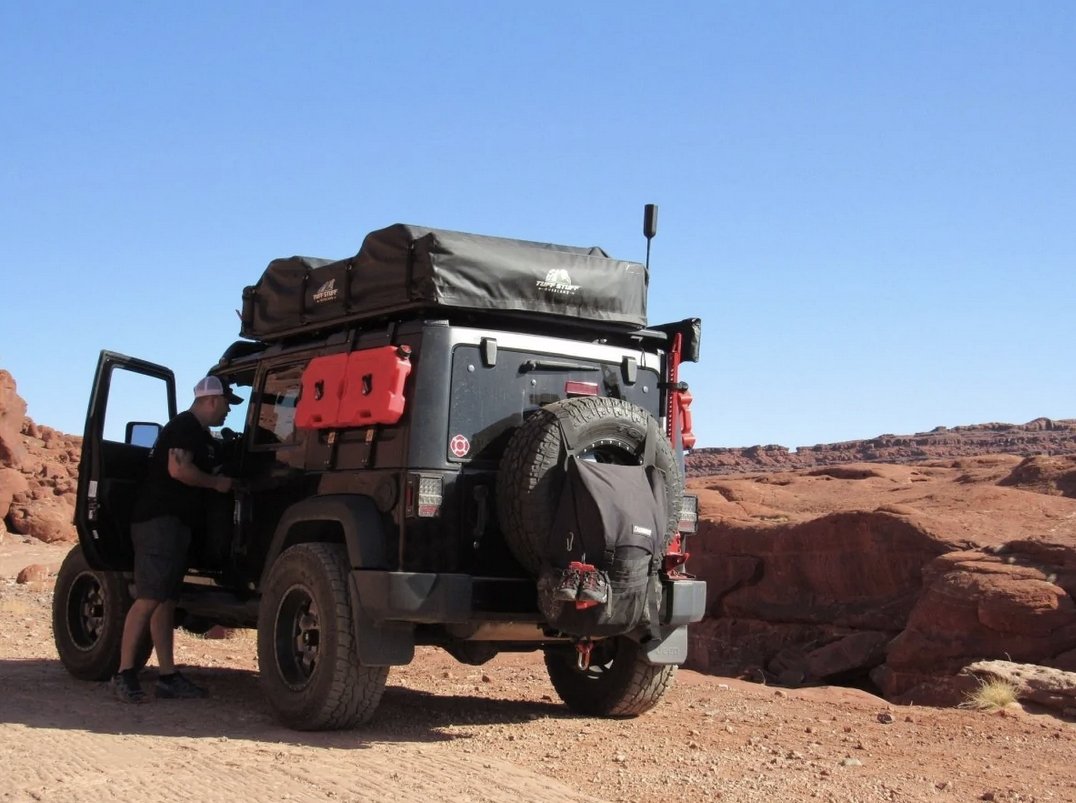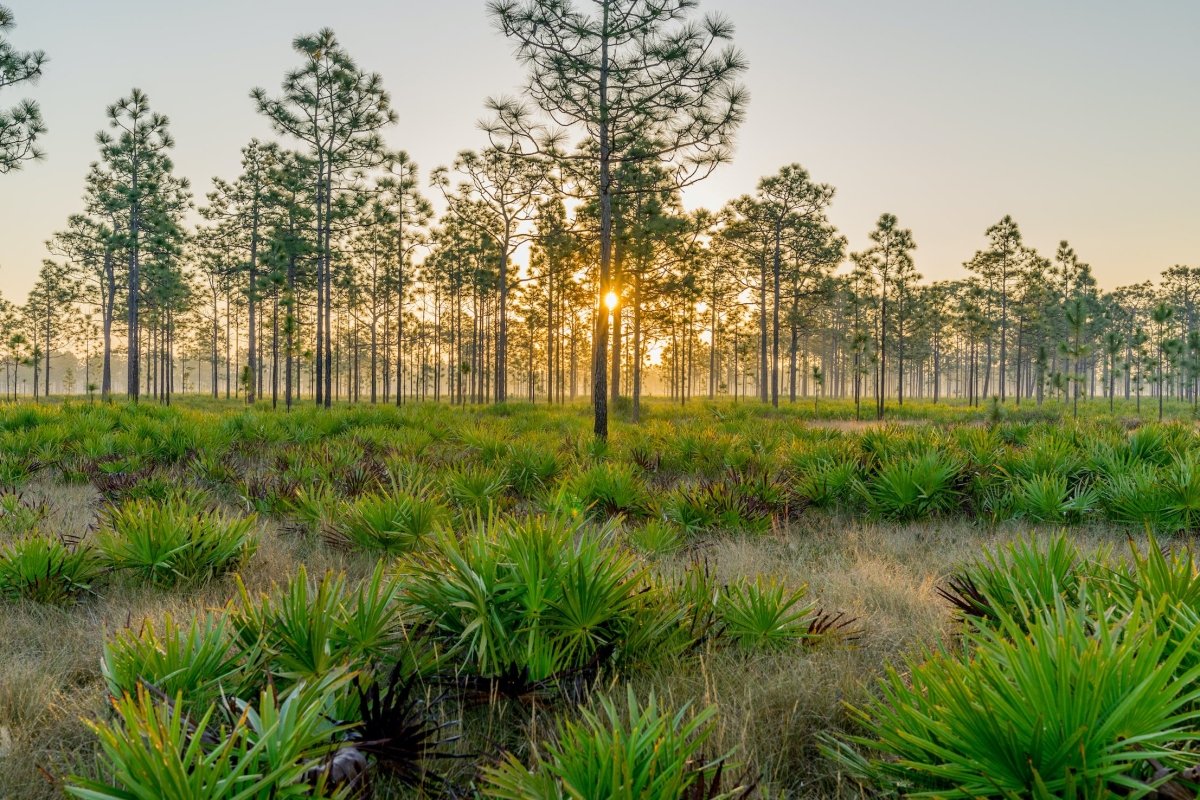Exploring nature allows us to experience raw, untouched beauty in places the average person cannot phantom.
While there are mundane means of adventures like weekend getaways to quaint lakeside campsites, there are other expedition-type exploration activities set aside for hardcore adventurers seeking to experience the wilder side of life. One such exploration is Overlanding.
The concept of Overlanding can be highly confusing, especially since it is relatively new to the camping scene. Although Overlanding, like any other camping activity, offers the promise of a beautiful experience in remote areas, it is a very different activity from other small getaways that you might have experienced.
Overlanding is a growing movement, and there is no better time to enjoy the ultimate overland experience than now. However, to get the most out of an overland trip, you must be armed with all the knowledge you can gather to familiarize yourself with this growing trend.
Below, we have provided everything you need to know about overland trips and why you shouldn’t waste more time planning your first overland trip.
What Is Overlanding?
If you are into the more traditional and reserved aspects of enjoying nature, simple camping trips to places with breathtaking beauties often suffice.
In these instances, you have a set destination in mind and probably plan activities like mountain climbing, hiking, swimming, or skiing, depending on your terrain and time of the year.
However, when you crave a more intense means of experiencing nature’s beauty, the simple acts of pitching a tent on a private campsite might begin to look bland, not promising the satisfaction you crave.
When it comes to hardcore outdoor activities, Overlanding trips are easily one of the most exciting activities you can engage in. An activity that amplifies the need for self-reliance and superb survival skills, Overlanding will leave any hardcore individual brave enough to attempt the movement feeling fulfilled, satisfied, and refreshed.
But What Exactly is Overlanding?
Overlanding is a more intense form of camping. However, due to what it entails, many people often argue that Overlanding is by no means a form of camping.
Overlanding is best described as a vehicle-based self-reliant journey in remote areas or locations. However, unlike other forms of camping, Overlanding is not destination-based but focuses more on the experience enjoyed along the way.
With overland trips, or overland camping as they are sometimes called, the ultimate goal is not to get to the terrain and set up camp before going back home but to savor every bit of the experience enjoyed along the way.
Over the years, especially since it became mainstream, many people have struggled to offer a definition for the term ‘Overlanding’ and successfully separate it from other forms of camping that it would otherwise be confused with. However, the simplest definition remains that Overlanding is a self-sufficient journey through uncharted territories to enjoy every bit of the trip.
Overlanding has been around for so many years- more than a century, in fact- but it has only recently been integrated into the camping scene. Because it has not been around for a long time, Overlanding is often mistaken for other activities like car camping or off-roading, especially since these activities share similarities.
However, if you ask any camping or exploration expert, they will tell you that Overlanding is an entirely different activity.
So, what makes Overlanding… Overlanding?
Historically and way before it was discovered as a lifestyle movement, Overlanding included driving livestock over long distances to other countries to market them away from where the livestock was initially reared.
The roads that probably marked the beginning of modern Overlanding were created by an Australian named Len Beadell, who opened new roads to pave the way for colonizers.
However, although it was influenced by a rich history of animal and human transport, modern Overlanding has nothing to do with business. In its modern form, Overlanding is a means of using mechanized transport to travel over challenging terrain in a journey where you are at the mercy of your survival skill.
This might sound like any other vehicle-centric recreational activity, but Overlanding is a scheme made of factors entirely different from other vehicle-based activities. These factors are:
Self-Reliance
With overland trips, self-reliance is an essential factor. On this journey, you are responsible for your survival, even as you travel through unfamiliar and untraveled terrains.
For days, weeks, or months depending on the duration of your journey, you cater to your every need. This means not only handling and managing your feeding, cleaning, and way-finding but also handling other tasks like fixing your vehicle when you find yourself in a sticky situation in the middle of nowhere.
Needless to say, this can be quite overwhelming.
Contrary to popular opinion, having considerable experience in Overlanding trips is not a medium to be self-sufficient on an overland trip (although experience will admittedly go a long way in helping you prepare for the trip). To be self-sufficient, you need to begin your expedition prepared and know how to make the right decisions.
Overland Vehicle
Overlanding is not an activity that requires fancy or luxury vehicles designed to keep you comfortable as you travel. Overlanding vehicles, also known as off-roading vehicles, are sturdy cars that are built to handle and conquer all types of terrain.
From dirt roads to washboard roads and fine beaches, these vehicles can handle almost all you throw at them. This is especially important because your vehicle is not only going to be your transportation vessel but also possibly your live-in quarters.
As a rule of thumb, off-road vehicles are usually strong vehicles with excellent traction and clearance. The stronger your vehicle, the better it is to maneuver. The better you can maneuver your overland vehicle, the smoother your trip will be.
Purpose
As we previously mentioned, Overlanding is an exploration and expedition-type journey. Overland campers solely aim to enjoy the experience they create while traveling through remote areas.
While other campers look forward to the end of their trip and setting up their tent at their destination, overland campers do not really have any destination in mind.
Although they might have a point where their expedition ends, this point is not the purpose of their trip, but the adventure of riding through unfamiliar terrain. Put simply, Overland travelers look forward to the trip and not the journey's end.
Duration
While many outdoor activities are usually ephemeral and last just a few days or weeks at most, Overlanding is generally engaged in as a long-time exploration. Although Overlanding can also last a few weeks, it is often stretched out to a few months or even years as many overland campers slowly explore the terrains and milk the experience they enjoy on their journey.
Location
Although there might be Overlanding laws in several places, you can pretty much explore any part of the world on your overland trip. All you need to do is find the perfect location, map your way through the area, pack up, and go! With Overlanding, there are lots of terrains you can explore.
Risk
Let’s face it, not everyone is built to handle long-distance journeys in the middle of nowhere, highly dependent on a vehicle and their survival skills. Although Overlanding is relatively low-risk, especially when you are prepared and armed with all the essential gear and equipment necessary for your survival, mismanaging your resources can cause a sour experience.
Camping
Since the purpose of Overlanding is to always be on the move, it is impossible to have a permanent camping place. Instead, you will put your self-reliance to the test by continuously erecting and taking down tents for shelter every time you make a stop in dispersed or designated campsites.
The great thing is every location has a camp waiting for you. Don’t know where to begin? Check out our list of the best overland camping spots in Texas and the best overland camping spots in California.

What Overland Travel Isn’t
Overland camping and other outdoor activities have some striking resemblance in their concepts that it is almost too easy to mistake one activity for the other. Now that you know what Overlanding is, it is just as important to understand what Overlanding isn’t.
Overlanding V.S. Off-Roading
Overlanding is often used interchangeably with off-roading. This common misconception can be attributed to the fact that both activities involve driving to remote locations over a particular period. However, off-roading and Overlanding are very different activities on different ends of a spectrum.
As we mentioned, Overlanding is a vehicle-supported adventure to remote locations where the primary purpose of the journey is the journey itself. This journey can be on well-managed terrain or cut across rugged and rarely traveled terrain challenging to maneuver. The terrain explored depends on the overlander’s experience, vehicle, and, of course, preferences.
On the other hand, off-roading is an activity that is performed mainly on rugged or off-road terrains. It is an activity where the sole purpose of the journey is to conquer terrain and test the driver's skill and strength of the vehicle.
Essentially, an overlander might travel on-road or off-road, but an off-roader is strictly restricted to off-road driving conditions that range from muddy to marshy to rocky and everything in between.
However, this is not the only difference.
Off-roading is mainly done in vehicles designed with off-roading capabilities that the average vehicle lacks. These vehicles are built to withstand the harsh and adverse off-road conditions that will otherwise ruin a regular car.
Overlanding can be done with mechanized vehicles with off-roading abilities. However, this is unnecessary as many people go Overlanding in their RVs or trucks. Overlanding trucks are also built to have more indoor space, which is a luxury off-roading vehicle can not afford.
Off-roading vehicles are made to be fast and sturdy, features that cannot be achieved if the car is laden with survival gear. Overlanding vehicles, on the other hand, are built to be a temporary home away from home and often emphasize space for survival kit storage.
Additionally, off-roading is generally done in a shorter period than Overlanding. Off-roading can last from a few days to a few weeks, while Overlanding can drag on for months or years.
Overlanding VS Camping
Overlanding is a form of extended camping. However, unlike regular camping, Overlanding does not focus on the destination but on the journey itself.
Although driving to the campsite is fun, it is a secondary interest, while the destination of the camp and the activities it holds are the main objective. When you go camping, you undoubtedly do so on campgrounds that offer amenities like water or electrical hookups (unless you go dispersed camping).
Although you will take basic amenities on these camping trips, your list will not be as extreme as the list of necessities while Overlanding. This differs from Overlanding, an activity where any sort of accommodation is self-managed.
While Overlanding, you do so in areas without the luxuries of amenities provided on a campground. You also pack more gear than you do while camping as you will be away for an extended period.
Camping and Overlanding may look the same, especially since Overlanding involves camping on the go, but they have noticeable and intricate differences.
Benefits of Overlanding
Overlanding is an excellent form of exploration with significant advantages. Some of these are:
- A chance to experience nature: When you go Overlanding, you get a chance to connect with nature and get away from the usual hubbub of urban societies. It is a great way to recharge and connect to your natural roots, giving you a chance to appreciate the world around you.
- Exploration: How often do you wish to see the world? Overlanding is one of the best ways to explore the view outside of the bubble you create for yourself and cross places off our ‘to-visit’ list.
- Increase experience: What better way to be an experienced overlander than to constantly go Overlanding when you can? Overlanding is a lifestyle, and to have the most fun, you need to have a few experience-based knowledge up your sleeves. With Overlanding, you get to see places, meet new people, and experience a whole new type of life that will prepare you for subsequent Overlanding trips.
- Save money: Overlanding allows you to save money while being intimate with nature. Admittedly, Overlanding is not exactly the cheapest outdoor activity you will ever engage in. However, it allows you to travel and cut out the cost of expensive hotels or private campsites (among other things) when you do so. With Overlanding, you can see the world on a budget.
- Live life slowly: if you ever feel like you are going too fast and not taking your time to enjoy life, going on an Overlanding trip is a great way to slow down. With this slow travel, you can take your time to enjoy the unique activities every trail offers and build a lifetime's worth of memories on every trip.

Who Can Go Overlanding
Anyone can go on an overland trip! You do not need to be a seasoned overlander to have all the overland fun.
All you need to do to go Overlanding is have a suitable Overlanding vehicle, research trails or roads you will love to travel on, and stock up on the essential overland gear.
Gear You Will Need
Overlanding is a self-reliant trip. To be self-sufficient, you need the necessary equipment for survival and the limited luxury you can afford. Some of these gear include:
- Vehicle recovery kit to keep your vehicle going: such as power winch, lift jack, and extra fuel.
- Way-finding and communicating gear: Maps, GPS devices, two-way radios, and a tracking beacon.
- Cooking utensils: pots, pans, water filter, portable camping stove, and fire starter.
- Hygiene essentials: toilet paper, hand sanitizer, soap, portable shower, and portable toilet.
- Sleeping gear: tent, pillows, blanket, and insulation mat.
- Emergency kit: First aid kit, fire extinguisher, and emergency bags
- Other essentials.
Is Overlanding An Activity For You?
Anyone can go Overlanding. From curious adventurers to families looking to bond while experiencing nature together, Overlanding is an excellent activity for everyone, often without restrictions.
However, it is essential to note that Overlanding isn't a carefree camping trip but a test of an explorer’s self-reliance.
If you decide to go Overlanding, it is essential always to remember that every decision you make, right from choosing your gear and how you store it to what routes you take, plays a crucial role in your survival and your experience on your Overlanding trip.
It is also essential to remember that on this self-reliant trip, you will be forgoing the luxuries that you have in private campsites for a more nomadic lifestyle.
Either way, Overlanding has an appeal that has grown ever since it became a mainstream movement. If everyone can go on fun overlanding trips, you can too!



